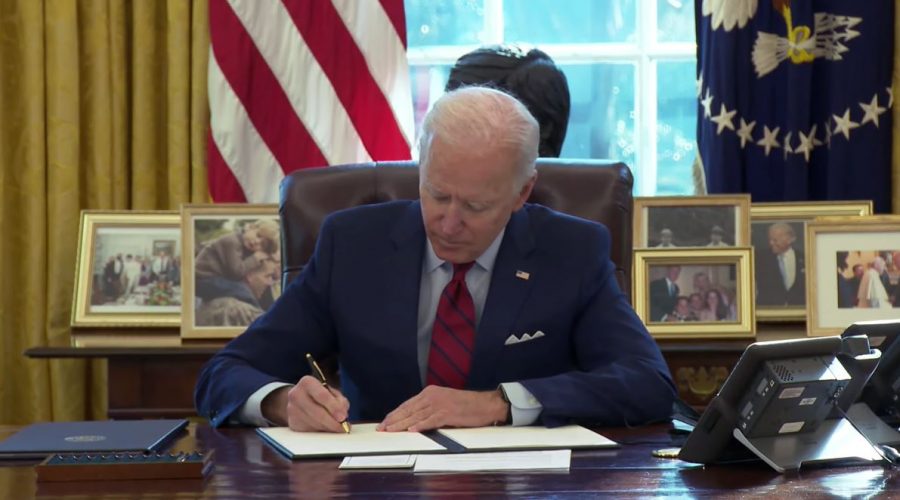United States Rejoins Paris Climate Agreement
Photo: Ilan_Gavrielow, Wikimedia Commons
Signature move: President Biden signs one of the many executive orders in the early days of his presidency.
March 16, 2021
President Joe Biden announced that the United States would rejoin the Paris Climate Agreement on Jan. 20, reversing the Trump Administration’s policy that removed the country last year. The executive order comes as a victory for environmentalists and other supporters of the agreement who argue it was a necessary step towards fighting climate change.
Although the reduction of carbon dioxide emissions over the past year due to the COVID-19 pandemic has helped reduce human impact on the environment, the Earth’s temperature continues to rise and in 2019 reached over two degrees above the pre-industrial average. Scientists argue that this rise can have disastrous effects, ranging from rising oceans to an increase in extreme weather events.
“We can no longer delay or do the bare minimum to address climate change,” Biden said. “This is a global existential crisis, and all of us will suffer if we fail.”
Before the pandemic struck, the United States was significantly behind on goals set during the Obama Administration to reduce emissions by 26% by 2025. With progress only at 12% in 2019, Biden now plans to introduce new goals with a deadline of 2030 to account for the rollback of key environmental policies during the Trump Administration.
The move fulfills one of Biden’s core campaign promises to place a greater focus on science when making policy decisions. It was also met with international praise, as leaders from around the world recognized the importance of the second largest emitter of carbon dioxide rejoining the agreement. With the global influence of the United States supporting the agreement, the goal of limiting further temperature increases appears more feasible.
“It’s a good day in our fight against the climate crisis,” Secretary of State Tony Blinken said. “The United States will waste no time in engaging our partners around the world to build our global resilience.”
Republicans, however, have been quick to criticize the move, claiming that it will raise energy costs for Americans while not doing enough to get adversaries like Russia and China to comply. The move comes as Biden attempts to reverse numerous Trump era policies such as immigration restrictions, the transgender military ban and construction of the border wall, further increasing tension between the parties.
The immediate impacts of the executive order will likely include new regulations on carbon emissions for the automotive and power sector. Various other policies to convert to sustainable energy will also be introduced to help the United States achieve its goal of net zero emissions by 2050.
To help push the United States to meet this benchmark, the Biden Administration plans to announce new emissions goals at an Earth Day conference with world leaders in April. The goals set at this summit and the extent to which the nation follows them in the coming years could determine the fate of the planet, and of humanity itself.



![AAAAAND ANOTHER THING: [CENSORED] [REDACTED] [BABY SCREAMING] [SIRENS] [SILENCE].](https://thehowleronline.org/wp-content/uploads/2025/06/lucy-1200x800.jpg)

















































![AAAAAND ANOTHER THING: [CENSORED] [REDACTED] [BABY SCREAMING] [SIRENS] [SILENCE].](https://thehowleronline.org/wp-content/uploads/2025/06/lucy-300x200.jpg)



